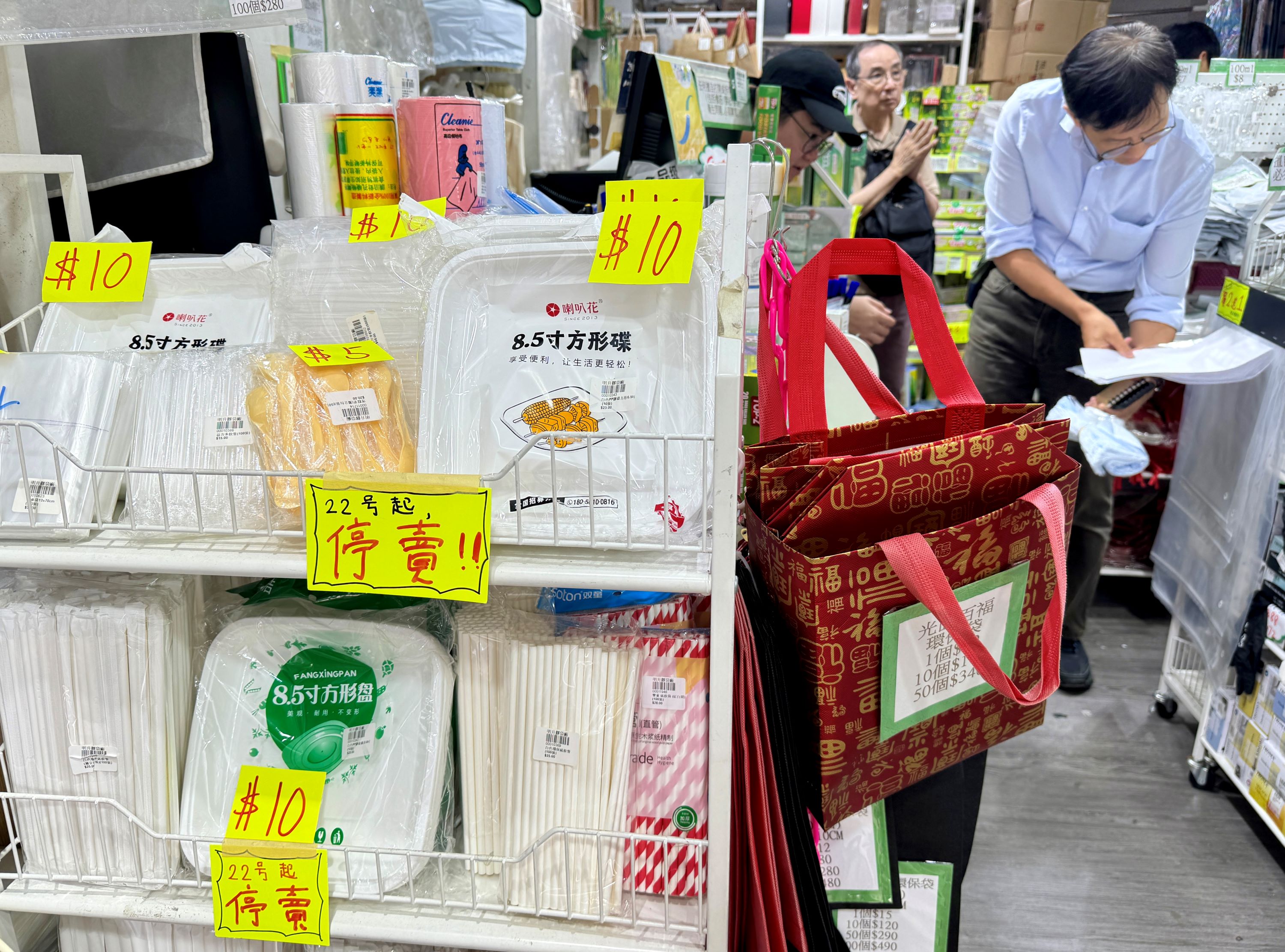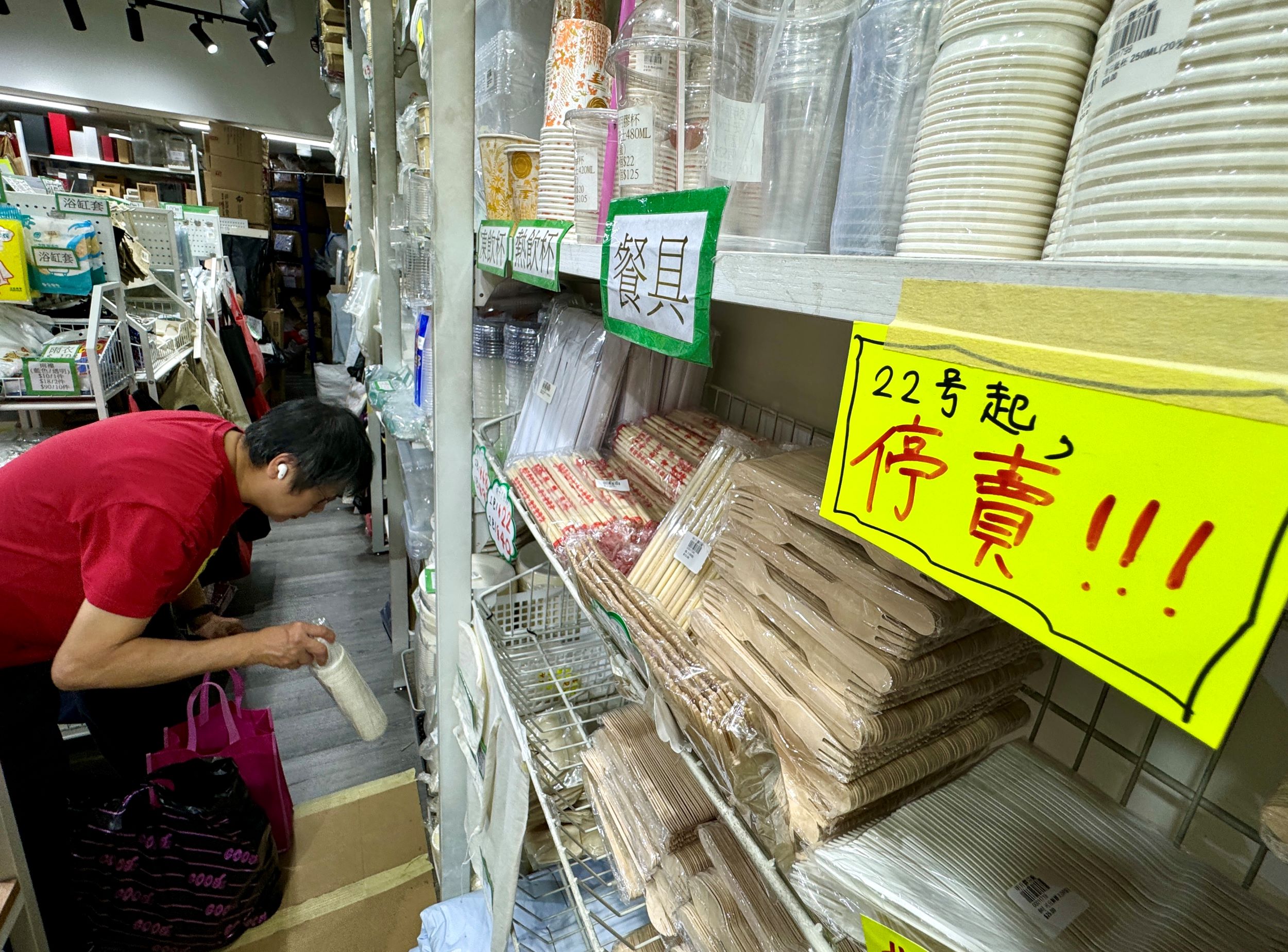
The six-month grace period that was set when Hong Kong’s new plastics-free regulation was introduced ends on Monday, with the use of an estimated 30 million sets of disposable cutlery having been eliminated since the regulation was first implemented, according to the government.
The government plans to start law enforcement action against businesses that do not comply with the new regulation, noting that many residents have changed their habits to embrace the green trend. A local organization found that around 14 percent of restaurants have violated the regulation.
The new regulation on single-use plastic products, effective since April 22 this year, allows for a phased approach to banning the sale and takeaway of such items. The initial phase prohibits the sale and provision of single-use plastics like straws, cutlery, and Styrofoam food containers. The second phase, potentially commencing as early as 2025, will extend the prohibition to encompass single-use plastic cups and containers utilized for takeaway services.
READ MORE: EPD: HK adapting well to plastic tableware ban
To allow businesses time to adjust, the government has refrained from enforcing penalties for non-compliance during the last six months since the implementation of the regulation.
In a statement released on Sunday, a spokesperson from the Environmental Protection Department (EPD) said that approximately 80 percent of customers frequenting restaurant chains have opted out of using takeaway cutlery, and about 30 percent of restaurants no longer provide any takeaway cutlery.
Within the retail and services sectors, property management firms revealed that a growing number of residents are embracing eco-friendly practices.
The prevalence of umbrella dryers has surged, supplanting disposable plastic umbrella bags. Also, more residents now carry reusable umbrella bags.
ALSO READ: Hong Kong's 'pay-as-you-throw' waste disposal put on hold
The prevalence of disposable plastic items, including balloon sticks, glow sticks, and party hats during festivals, has also markedly declined. Businesses are actively providing more sustainable products, the spokesperson said.
In addition, the usage of disposable plastic items in the hotel industry has plummeted by over 80 percent. For instance, a medium-sized hotel has eliminated the issuance of 20,000 plastic water bottles and 30,000 disposable plastic toiletry items like shampoo and shower gel sets over the last six months.
The EPD spokesperson said that, despite the rising trend in residents bringing their own tableware for takeout orders, there is an ongoing demand for non-plastic disposable tableware.
ALSO READ: CE: Plastic tableware ban response positive
Since the implementation of the new regulation, the Green Tableware Platform, established by the EPD to promote sustainable alternatives to disposable plastic tableware, has witnessed substantial growth. The platform now boasts a large number of suppliers, soaring from over 60 to more than 150. Furthermore, the range of non-plastic alternative products showcased on the platform has expanded from over 1,000 to more than 1,700 options.

After the adaptation phase concludes on Monday, the Environmental Protection Department will maintain its focus on publicity and educational initiatives, complemented by enforcement measures.
With a focus on the supply side, the department will inspect retail outlets first and issue warnings to those that fail to comply with the regulation and will require them to make improvements within 10 working days.
READ MORE: HK plastics ban receives mixed response
If the business is still non-compliant after that period, a fixed penalty notice will be issued to the responsible person.
Similar measures will also be implemented to address violations in the catering and hotel sectors based on complaints.
The EPD said it urges all pertinent businesses that have not yet complied with the regulatory standards act promptly.
“Legislation is merely one of the tools, while our ultimate goal is to foster societal recognition and establish a plastic-free culture,” the spokesperson said.
A local green tableware supplier surnamed Yip said that, with the increasing stability in the production of non-plastic disposable tableware and the decreased transportation costs resulting from bulk purchases, current product prices have decreased by approximately 10 percent compared to the initial period.
ALSO READ: Industry calls for more education and assistance ahead of plastics ban
Angus Ho Hon-wai, executive director of Greeners Action, a longstanding local environmental protection organization, said that some restaurants are still using disposable plastic products and are in breach of the law.
Between September and October of this year, Greeners Action surveyed a total of 157 small and chain restaurants across different districts. The investigation revealed that 14 percent of these establishments continued to offer plastic drinking straws, while 5.7 percent provided plastic cups or lids, and 2 percent utilized plastic lunchboxes or lids.
Non-compliance regarding disposable plastic drinking straws is notably severe, Ho said, adding that he believes this situation has arisen because many restaurants still possess substantial stockpiles.
READ MORE: Solid waste at Hong Kong's landfills down 2%
To address this issue, the government could collaborate with restaurants to repurpose stocked plastic straws for medical use, potentially aiding patients with swallowing difficulties, Ho said.
Ho also urged the government to specify the implementation date for the second phase of the regulation.
For the second phase, the government should also set a grace period to allow the public and restaurants sufficient time to adjust to the upcoming changes, Ho added.


